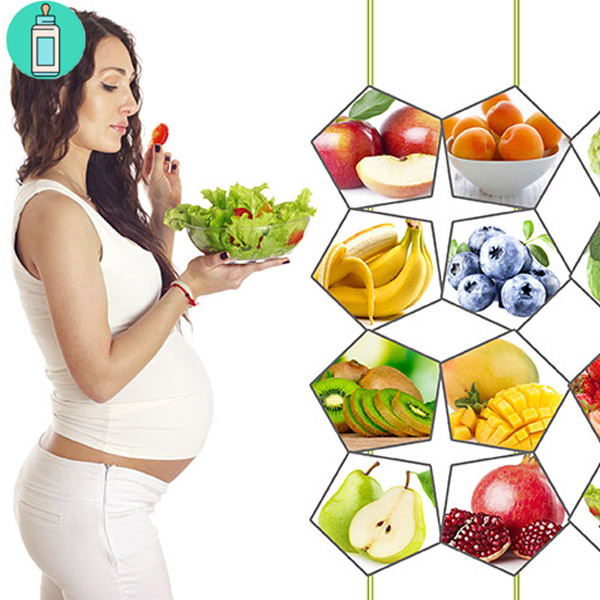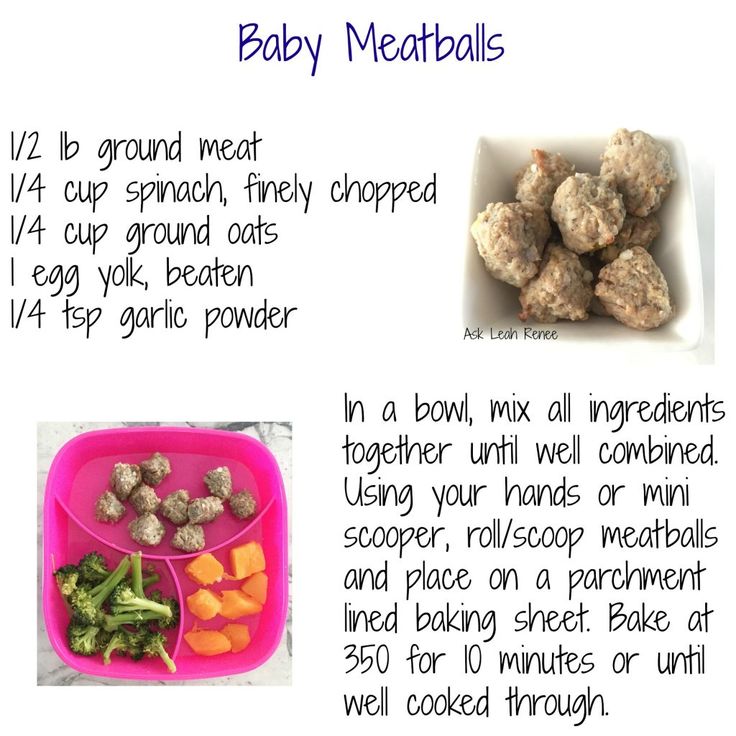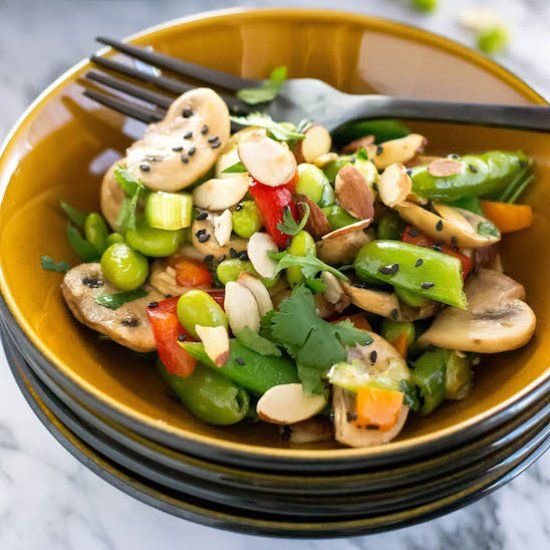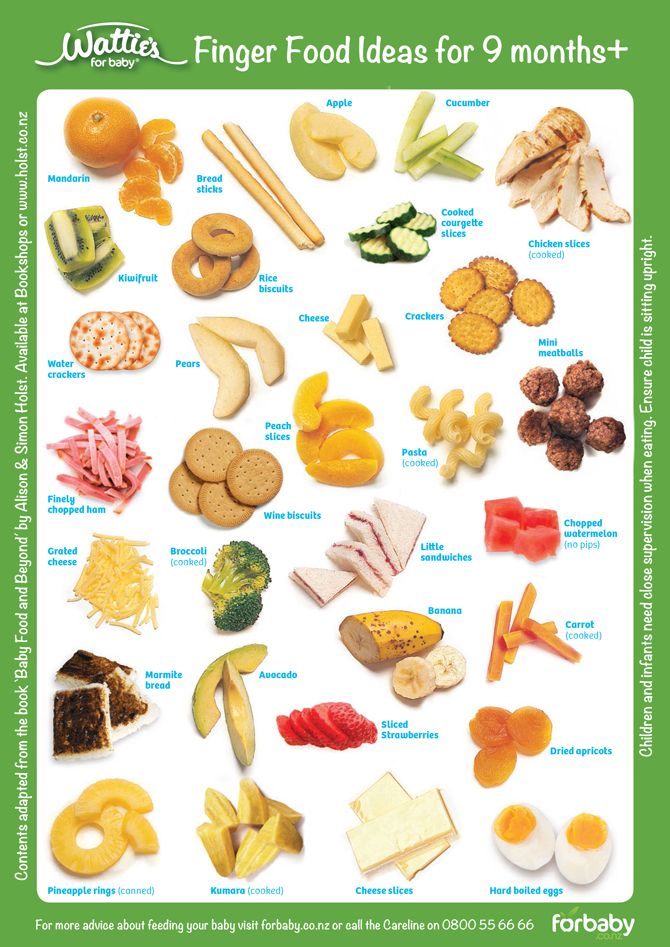Best foods to help baby grow during pregnancy
10 Healthy Foods to Eat When Pregnant
There’s nothing like finding out you’re pregnant to encourage better eating habits. After all, your body is going through big changes, and both you and baby need a full dose of vitamins and nutrients to stay well and strong. But what counts as healthy food for pregnancy? Don’t worry—we’ve got you covered. Here are 10 of the best foods to eat when pregnant, and why.
What it’s got: Whether you like them fried, scrambled, hard-boiled or served as an omelet, eggs are the gold standard for prenatal protein. They also happen to be a great source of folate, iron and choline.
Why it’s good for both of you: Not only are eggs a relatively cheap, versatile and convenient source of protein, but they contain choline too. Never heard of that last one? Choline is critical to fetal brain development and reduces the risk of neural tube defects, such as spina bifida. But to reap the benefits, you’ll have to eat the whole thing, since choline is contained in the yolk (so forget the egg-whites-only order). Bonus: Give baby a brain boost by buying eggs fortified with omega-3s.
Sweet Potatoes
What it’s got: Don’t just save these guys for Thanksgiving—sweet potatoes are full of nutritious fiber, vitamin B6, potassium (even more than bananas have!), vitamin C and iron, as well as copper and beta-carotene.
Why it’s good for both of you: Sure, other foods on our list offer many of the same nutrients, but we’re singling out sweet potatoes for their beta-carotene, an antioxidant that your body converts to vitamin A. And as you may recall, vitamin A plays an important role in the development of baby’s eyes, bones and skin. These orange spuds are also a great way to meet your iron quota, and also contain copper, a mineral that helps your body absorb iron. So swap in sweet potatoes for your usual sides; they’re great mashed, baked or French-fried (um, yum!).
What they’ve got: This crunchy (and convenient) snack is full of healthy fats (including those brain-boosting omega-3s we mentioned earlier), protein, fiber and a variety of vitamins and minerals. Plus, noshing on nuts will help make a dent in the 350 milligrams of magnesium you’re supposed to get now that you’re preggers.
Plus, noshing on nuts will help make a dent in the 350 milligrams of magnesium you’re supposed to get now that you’re preggers.
Why they’re good for both of you: Munching on magnesium-rich foods helps reduce the risk of premature labor and aids in the development of baby’s nervous system. A cup of sliced almonds contains nearly 250 mg of magnesium, so keep a stash in your purse for a convenient prenatal power snack. Cravings control: If you feel like a bottomless pit these days, try noshing on pistachios with shells. They have slightly less magnesium (150 mg per cup), but they take longer to eat, giving your body more time to register that it’s full.
Beans and Lentils
What they’ve got: If you’re not a big meat eater (or one at all), beans and lentils are great sources of protein and iron, as well as folate, fiber and calcium. And beans (especially baked ones) are also bursting with zinc.
Why they’re good for both of you: Beans boast a bunch of the baby- and mom-friendly minerals found in animal products, so they’re a great option for vegetarian and vegan moms-to-be.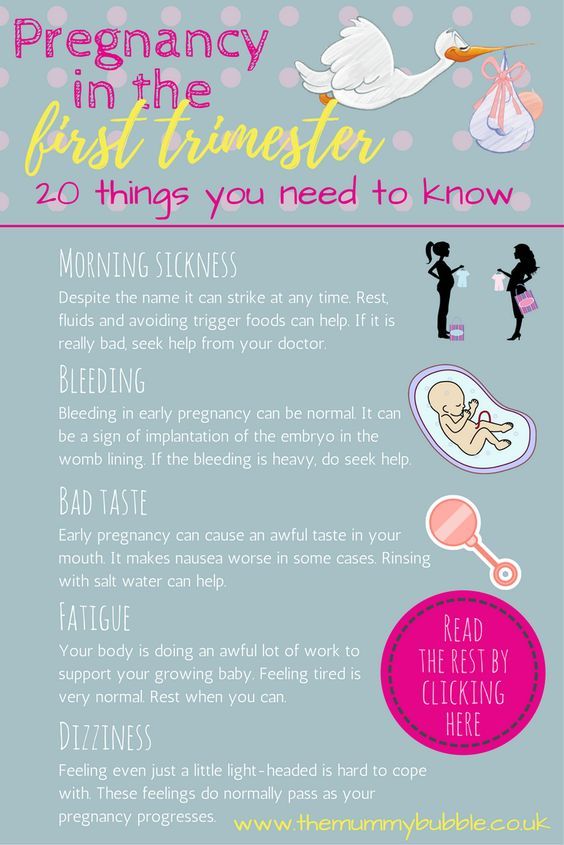 Beans are also rich in zinc, an essential mineral that’s linked to a lower risk for preterm delivery, low birth weight and prolonged labor. Beans bother your stomach? Other great sources of zinc include meat, chicken, milk, fortified cereals, cashews, peas, crab and oysters (just don’t eat them raw!).
Beans are also rich in zinc, an essential mineral that’s linked to a lower risk for preterm delivery, low birth weight and prolonged labor. Beans bother your stomach? Other great sources of zinc include meat, chicken, milk, fortified cereals, cashews, peas, crab and oysters (just don’t eat them raw!).
Lean Meat
What it’s got: Sure, you know it’s a great source of protein, but lean beef and pork are also packed with iron and B vitamins.
Why it’s good for both of you: Your body needs a lot more protein now (about 25 extra grams a day) to help baby grow and to ensure that her muscles develop properly. Same goes for iron: Not getting enough of this mineral can impair baby’s growth and increase the risk for preterm delivery and low birth weight. Iron is important for mom, too—it’s necessary for red blood cell formation (to prevent anemia). During pregnancy, your blood volume increases, so you’ll need to up your iron intake (to around 27 milligrams a day).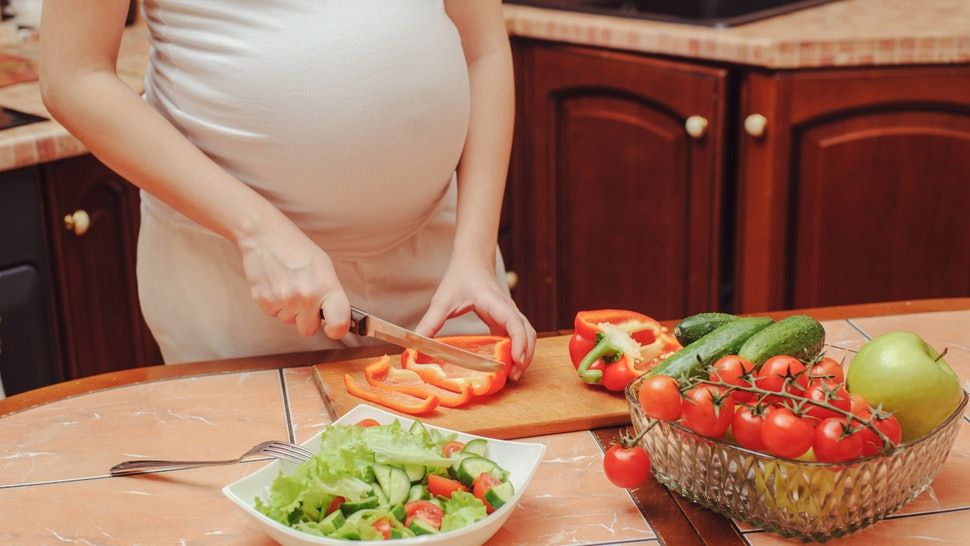 Bonus: Meat supplies a hefty dose of vitamins B6, which helps baby’s tissue and brain growth while easing mom’s morning sickness, and B12, which helps maintain healthy nerves and red blood cells.
Bonus: Meat supplies a hefty dose of vitamins B6, which helps baby’s tissue and brain growth while easing mom’s morning sickness, and B12, which helps maintain healthy nerves and red blood cells.
Orange Juice
What it’s got: Down a glass of OJ in the morning to fill up on folate, potassium and, of course, vitamin C.
Why it’s good for both of you: You’ve probably heard a lot of buzz about folate and folic acid (the synthetic form that you get in supplements and fortified foods), and with good reason: It’s a necessary nutrient for preventing certain birth defects early on in pregnancy, and for ensuring a healthy pregnancy after that, so try to get the recommended 400 micrograms a day. The potassium in OJ is important for keeping your muscle function, metabolism and overall health in check. Like iron, pregnant women need to consume more potassium because of their expanding blood volume. And as you already know, orange juice is an excellent source of vitamin C, which, in addition to fighting colds, helps your body better absorb iron and keeps both your and baby’s teeth and bones healthy.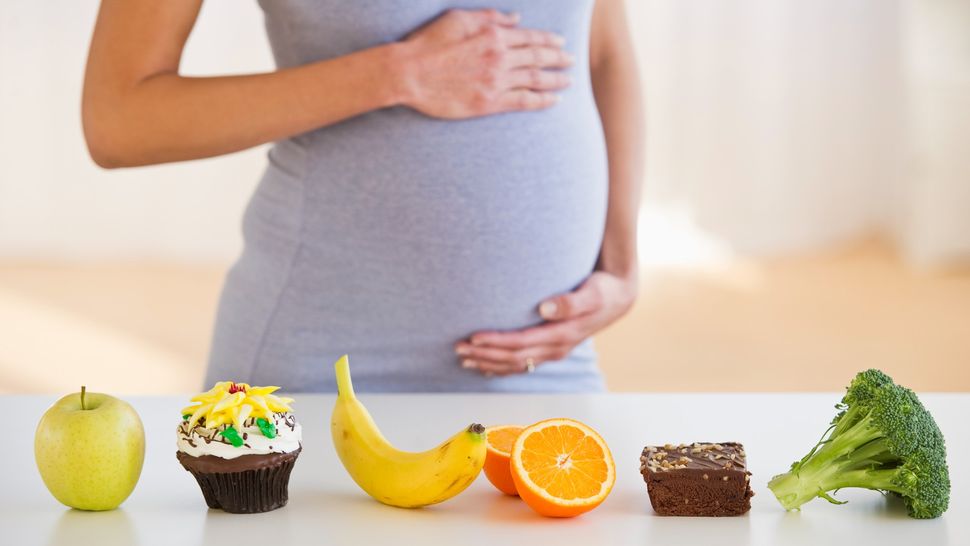
You can also get your vitamin C from broccoli, tomatoes, strawberries, red peppers and a variety of citrus fruits, including another prenatal power food: mangoes, which are packed with more than 20 different vitamins and minerals. Bonus: Opt for OJ that’s fortified with vitamin D, which increases blood circulation in the placenta and aids in calcium absorption so baby will have stronger bones.
Yogurt
What it’s got: Surprise! Plain yogurt actually contains slightly more calcium than milk. Plus, it’s got essential bone-building nutrients, including protein, B vitamins and zinc.
Why it’s good for both of you: Calcium is essential for keeping your bones and teeth healthy and helping baby to develop his, and skimping on this key nutrient could put you both at risk. Expectant moms should get 1,000 mg of calcium a day to reduce the risk of low birth weight and preterm delivery. If your calcium count comes up short, your body will take the calcium baby needs from your bones, putting you at greater risk for osteoporosis later on. Bonus: Snack on Greek yogurt topped with fruit for double the protein (and fiber) punch.
Bonus: Snack on Greek yogurt topped with fruit for double the protein (and fiber) punch.
Oatmeal
What it’s got: Those oats are filled with fiber, protein and vitamin B6.
Why it’s good for both of you: Start your morning off right with a nice big bowl of oatmeal. Whole grains are great for keeping your energy levels up, especially if morning sickness has you feeling a bit drained. Plus, all that fiber will help with another pregnancy pleasantry: constipation. But the benefits don’t just stop with mom. This convenient breakfast dish (yep, the instant kind is great too!) also contains protein and vitamin B6, both of which are important for baby’s development. Bonus: Look for a variety that’s fortified with iron, B vitamins and folic acid.
Leafy Greens
What it’s got: You had to know these guys were gonna make the list. Chock-full of antioxidants and nutrients, dark-green veggies—including spinach, asparagus, broccoli and kale—should be on everyone’s pregnancy grocery list.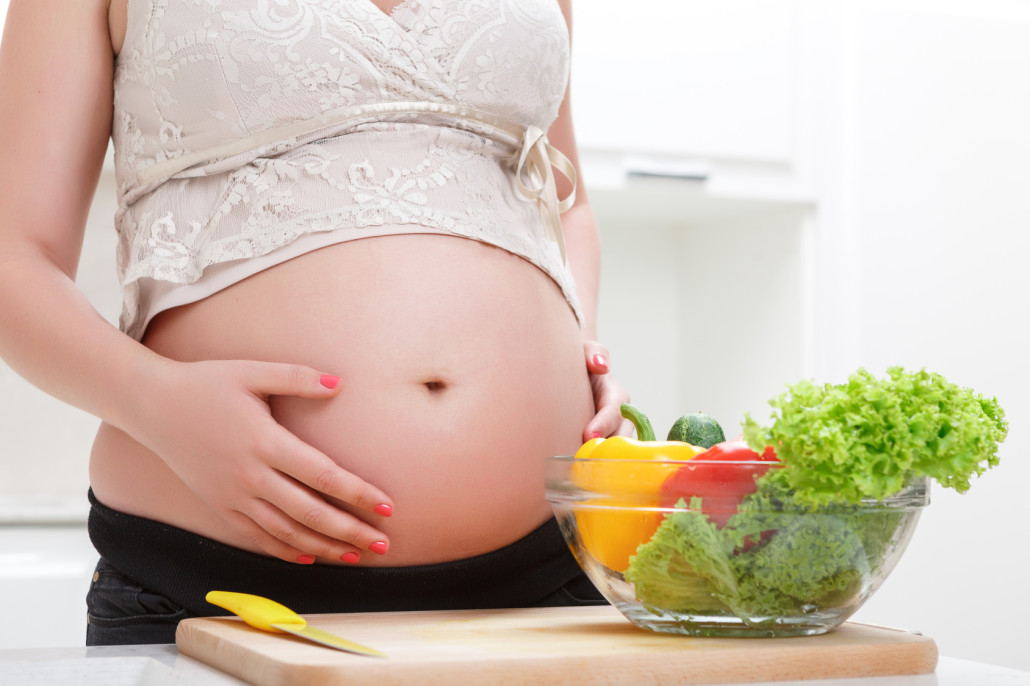
Why it’s good for both of you: These superfoods are especially important for moms-to-be and developing babies. That’s because, in addition to all those antioxidants, leafy greens supply calcium, potassium, fiber, folate and vitamin A. Not exactly craving asparagus or spinach? Oranges are also a great source of vitamin A.
Salmon
What it’s got: This oily fish is an excellent source of omega-3 fatty acids and protein.
Why it’s good for both of you: Forget about preordering Baby Einstein DVDs to give baby a brain-boost—just incorporate salmon into your diet over the next nine months. The omega-3 fatty acids (aka DHA and EPA) in fish help baby’s brain to develop, and higher levels of DHA in newborns have even been associated with higher IQs, advanced motor skills and fewer neurological problems later on. Omega-3s are good for the development of baby’s eyes too, and salmon is also a great source of lean protein for moms-to-be.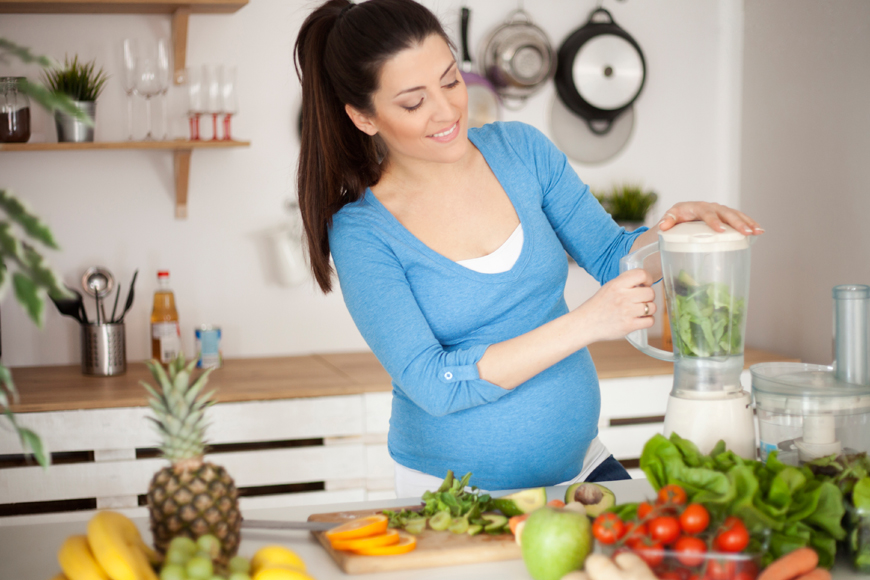 Worried about seafood? Salmon is low in mercury and considered safe for expectant moms, but limit your intake to two to three servings of four ounces or less each week to be safe. Just not feeling fish right now? Snack on walnuts and almonds.
Worried about seafood? Salmon is low in mercury and considered safe for expectant moms, but limit your intake to two to three servings of four ounces or less each week to be safe. Just not feeling fish right now? Snack on walnuts and almonds.
The Bump experts: Elizabeth Ward, RD ExpecttheBestPregnancy.com; Maria Pari-Keener, RD, founder of Maternal Health Matters, an NYC practice offering prenatal and postnatal counseling.
Please note: The Bump and the materials and information it contains are not intended to, and do not constitute, medical or other health advice or diagnosis and should not be used as such. You should always consult with a qualified physician or health professional about your specific circumstances.
Pregnancy Diet: 13 Foods to Eat While Pregnant
Pregnant? Hangry? Looking for a snack that will make your tummy and your baby happy? You’re probably hearing it a lot: Eating nutritious foods while pregnant is essential.
We’re here to make your pantry into a one-stop shop of healthy and delicious foods that will give your baby the best start to life.
When building your healthy eating plan, you’ll want to focus on whole foods that give you higher amounts of the good stuff you’d need when not pregnant such as:
- protein
- vitamins and minerals
- healthy types of fat
- complex carbohydrates
- fiber and fluids
Here are 13 super nutritious foods to eat when you’re pregnant to help make sure you’re hitting those nutrient goals.
During pregnancy, you need to consume extra protein and calcium to meet the needs of your growing little one. Dairy products like milk, cheese, and yogurt should be on the docket.
Dairy products contain two types of high-quality protein: casein and whey. Dairy is the best dietary source of calcium, and provides high amounts of phosphorus, B vitamins, magnesium, and zinc.
Yogurt, especially Greek yogurt, contains more calcium than most other dairy products and is especially beneficial. Some varieties also contain probiotic bacteria, which support digestive health.
Some varieties also contain probiotic bacteria, which support digestive health.
If you’re lactose intolerant, you may also be able to tolerate yogurt, especially probiotic yogurt. Check with your doctor to see if you can test it out. A whole world of yogurt smoothies, parfaits, and lassi could be waiting.
This group of food includes lentils, peas, beans, chickpeas, soybeans, and peanuts (aka all kinds of fabulous recipe ingredients!).
Legumes are great plant-based sources of fiber, protein, iron, folate, and calcium — all of which your body needs more of during pregnancy.
Folate is one of the most essential B vitamins (B9). It’s very important for you and baby, especially during the first trimester, and even before.
You’ll need at least 600 micrograms (mcg) of folate every day, which can be a challenge to achieve with foods alone. But adding in legumes can help get you there along with supplementation based on your doctor’s recommendation.
Legumes are generally very high in fiber, too. Some varieties are also high in iron, magnesium, and potassium. Consider adding legumes to your diet with meals like hummus on whole grain toast, black beans in a taco salad, or a lentil curry.
Some varieties are also high in iron, magnesium, and potassium. Consider adding legumes to your diet with meals like hummus on whole grain toast, black beans in a taco salad, or a lentil curry.
Sweet potatoes are not only delicious cooked about a thousand ways, they’re also rich in beta carotene, a plant compound that is converted into vitamin A in your body.
Vitamin A is essential for baby’s development. Just watch out for excessive amounts of animal-based sources of vitamin A, such as organ meats, which can cause toxicity in high amounts.
Thankfully, sweet potatoes are an ample plant-based source of beta carotene and fiber. Fiber keeps you full longer, reduces blood sugar spikes, and improves digestive health (which can really help if that pregnancy constipation hits).
For a fab brekky, try sweet potatoes as a base for your morning avocado toast.
Smoked on a whole wheat bagel, teriyaki grilled, or slathered in pesto, salmon is a welcome addition to this list.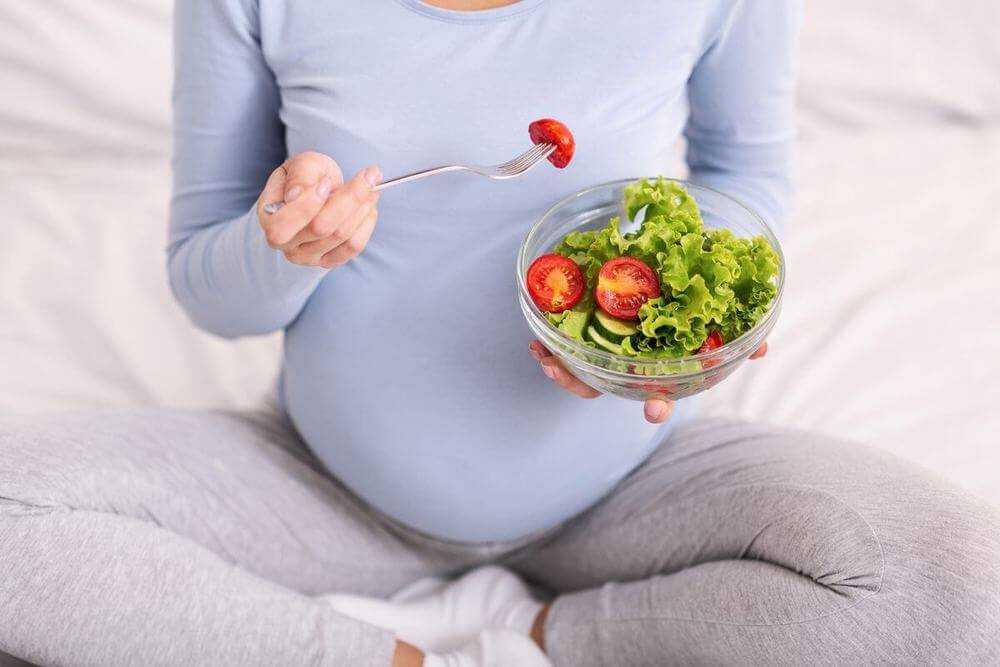 Salmon is rich in essential omega-3 fatty acids that have a host of benefits.
Salmon is rich in essential omega-3 fatty acids that have a host of benefits.
These are found in high amounts in seafood, and help build the brain and eyes of your baby and can even help increase gestational length.
But wait: Have you been told to limit your seafood intake due to the mercury and other contaminants found in high mercury fish? You can still eat fatty fish like salmon.
Here are the high mercury fish to avoid:
- swordfish
- shark
- king mackerel
- marlin
- bigeye tuna
- tilefish from the Gulf of Mexico
Plus, salmon is one of the very few natural sources of vitamin D, which is lacking for most of us. It’s important for bone health and immune function.
Those incredible, edible eggs are the ultimate health food, as they contain a little bit of almost every nutrient you need. A large egg contains about 80 calories, high-quality protein, fat, and many vitamins and minerals.
Eggs are a great source of choline, a vital nutrient during pregnancy.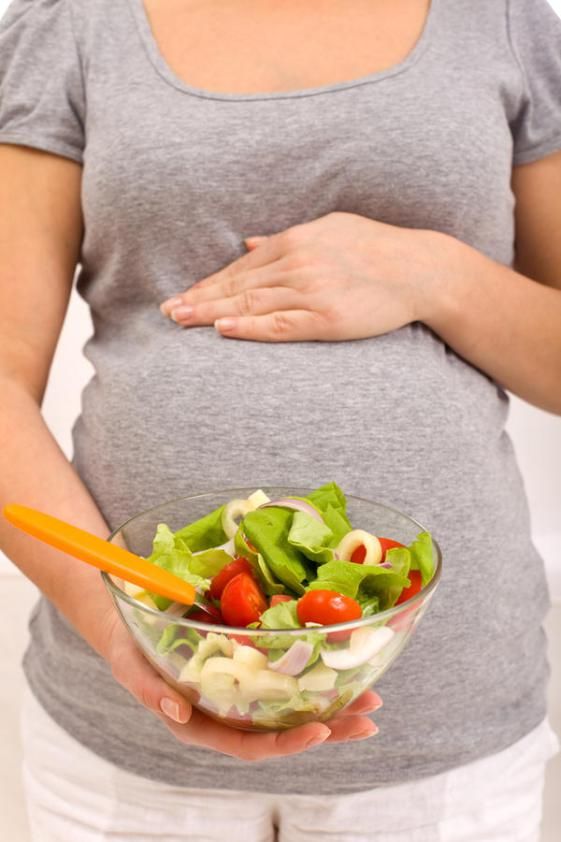 It’s important in baby’s brain development and helps prevent developmental abnormalities of the brain and spine.
It’s important in baby’s brain development and helps prevent developmental abnormalities of the brain and spine.
A single whole egg contains roughly 147 milligrams (mg) of choline, which will get you closer to the current recommended choline intake of 450 mg per day while pregnant (though more studies are being done to determine if that is enough).
Here are some of the healthiest ways to cook eggs. Try them in spinach feta wraps or a chickpea scramble.
No surprise here: Broccoli and dark, green vegetables, such as kale and spinach, pack in so many of the nutrients you’ll need. Even if you don’t love eating them, they can often be squirreled into all kinds of dishes.
Benefits include fiber, vitamin C, vitamin K, vitamin A, calcium, iron, folate, and potassium. They’re a bonanza of green goodness.
Adding in servings of green veggies is an efficient way to pack in vitamins and fend off constipation due to all that fiber. Vegetables have also been linked to a reduced risk of low birth weight.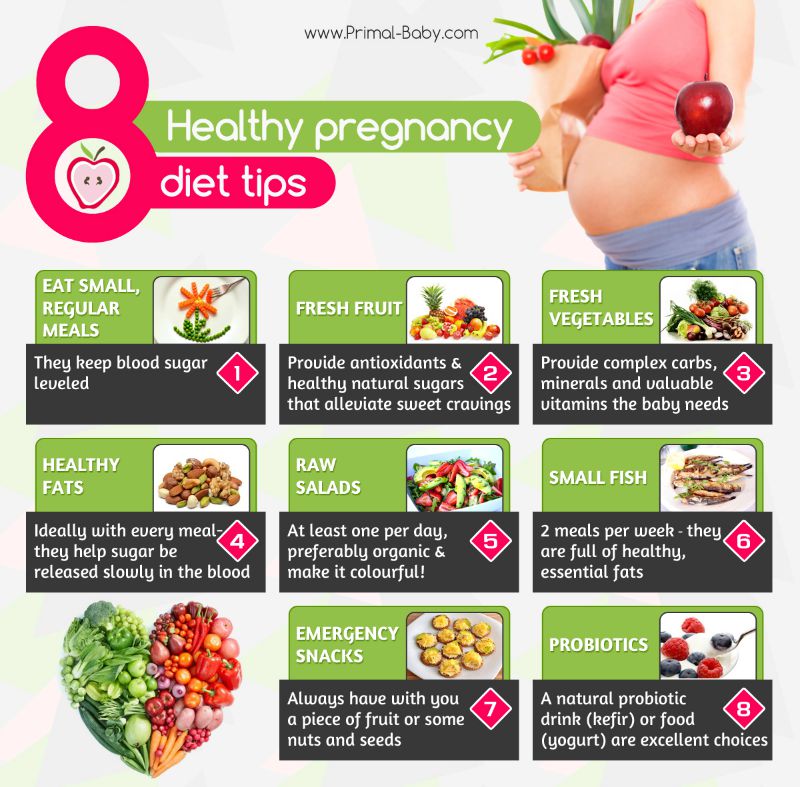
Try this kale eggs Florentine recipe or blend some spinach into a green smoothie and you won’t even know it’s in there.
Lean beef, pork, and chicken are excellent sources of high-quality protein. Beef and pork are also rich in iron, choline, and other B vitamins — all of which you’ll need in higher amounts during pregnancy.
Iron is an essential mineral that is used by red blood cells as a part of hemoglobin. You’ll need more iron since your blood volume is increasing. This is particularly important during your third trimester.
Low levels of iron during early and mid-pregnancy may cause iron deficiency anemia, which increases the risk of low birth weight and other complications.
It can be hard to cover your iron needs with meals alone, especially if you develop an aversion to meat or are vegetarian or vegan. However, for those who can, eating lean red meat regularly may help increase the amount of iron you’re getting from food.
Pro tip: Pairing foods that are rich in vitamin C, such as oranges or bell peppers, along with iron-rich foods may also help increase absorption.
Toss some vitamin C-rich tomato slices on that turkey burger or whip up this steak and mango salad.
Berries hold a lot of goodness in their tiny packages like water, healthy carbs, vitamin C, fiber, and antioxidants.
Berries have a relatively low glycemic index value, so they should not cause major spikes in blood sugar.
Berries are also a great snack, as they contain both water and fiber. They provide a lot of flavor and nutrition, but with relatively few calories.
Some of the best berries to eat while pregnant are blueberries, raspberries, goji berries, strawberries, and acai berries. Check out this blueberry smoothie for some inspiration.
Unlike their refined counterparts, whole grains are packed with fiber, vitamins, and plant compounds. Think oats, quinoa, brown rice, wheat berries, and barley instead of white bread, pasta, and white rice.
Some whole grains, like oats and quinoa, also contain a fair amount of protein. They also hit a few buttons that are often lacking in pregnant people: B vitamins, fiber, and magnesium.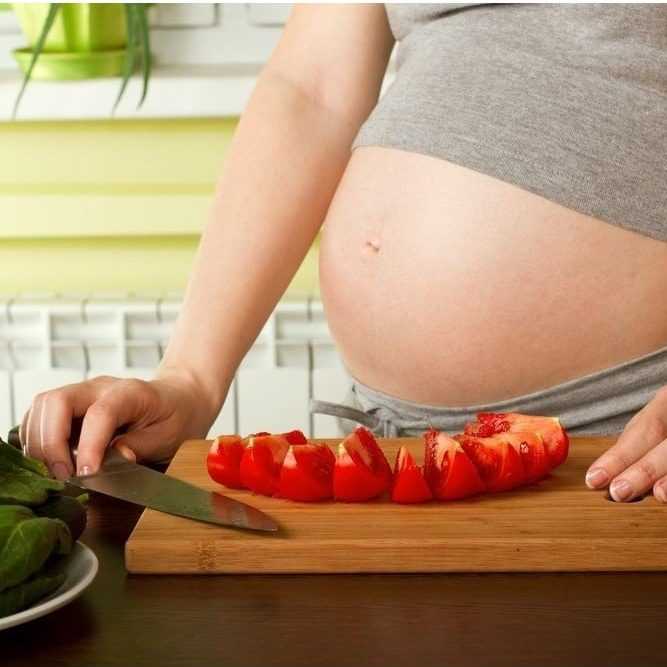
There are so many ways to adds whole grains to any meal, but we’re especially liking this quinoa and roasted sweet potato bowl.
Avocados are an unusual fruit because they contain a lot of monounsaturated fatty acids. This makes them taste buttery and rich — perfect for adding depth and creaminess to a dish.
They’re also high in fiber, B vitamins (especially folate), vitamin K, potassium, copper, vitamin E, and vitamin C.
Because of their high content of healthy fats, folate, and potassium, avocados are a great choice during pregnancy (and always).
The healthy fats help build the skin, brain, and tissues of your little one, and folate may help prevent neural tube defects, developmental abnormalities of the brain and spine such as spina bifida.
Potassium may help relieve leg cramps, a side effect of pregnancy for some women. In fact, avocados contain more potassium than bananas.
Try them as guacamole, in salads, in smoothies, and on whole wheat toast, but also as a substitute for mayo or sour cream.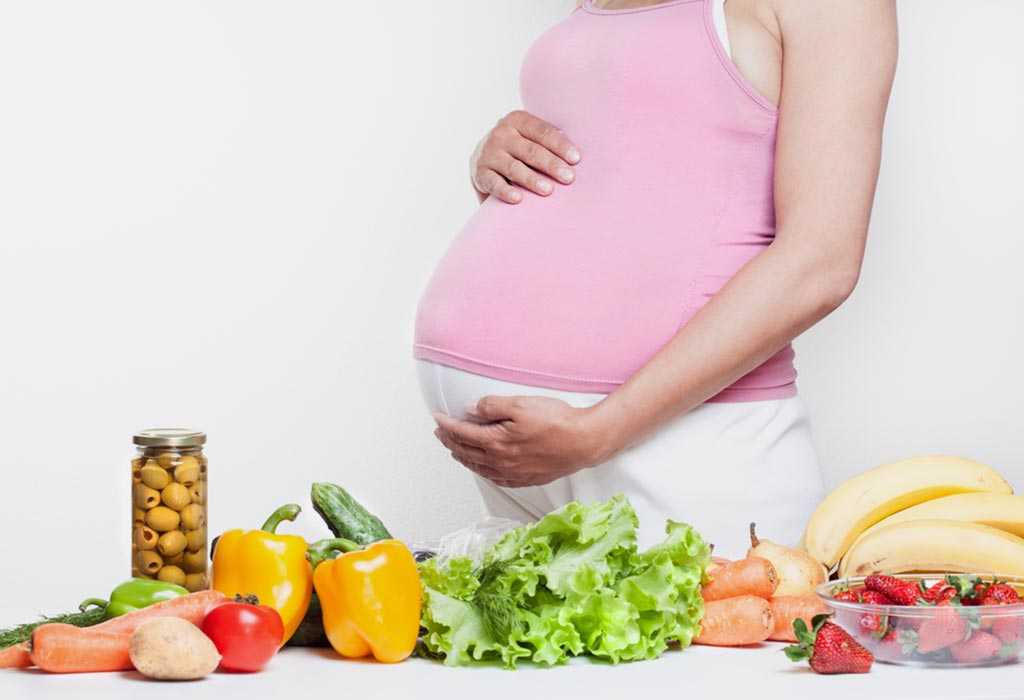
Dried fruit is generally high in calories, fiber, and various vitamins and minerals. One piece of dried fruit contains the same amount of nutrients as fresh fruit, just without all the water and in a much smaller form.
One serving of dried fruit can provide a large percentage of the recommended intake of many vitamins and minerals, including folate, iron, and potassium.
Prunes are rich in fiber, potassium, and vitamin K. They’re natural laxatives and may be very helpful in relieving constipation. Dates are high in fiber, potassium, iron, and plant compounds.
However, dried fruit also contains high amounts of natural sugar. Make sure to avoid the candied varieties, which contain even more sugar.
Although dried fruit may help increase calorie and nutrient intake, it’s generally not recommended to consume more than one serving at a time.
Try adding a small portion to a trail mix with nuts and seeds for an on-the-go protein- and fiber-filled snack.
Fish liver oil is made from the oily liver of fish, most often cod. It’s rich in the omega-3 fatty acids EPA and DHA, which are essential for fetal brain and eye development.
It’s rich in the omega-3 fatty acids EPA and DHA, which are essential for fetal brain and eye development.
Supplementing with fish oil may help protect against preterm delivery and may benefit fetal eye development.
Fish liver oil is also very high in vitamin D, of which many people don’t get enough. It may be highly beneficial for those who don’t regularly eat seafood or supplement with omega-3 or vitamin D.
A single serving (1 tablespoon or 15 milliliters) of fish liver oil provides more than the recommended daily intake of omega-3, vitamin D, and vitamin A.
However, it’s not recommended to consume more than one serving per day, as too much preformed vitamin A can be dangerous for your baby. High levels of omega-3 may also have blood-thinning effects.
Low mercury fish like salmon, sardines, canned light tuna, or pollock can also help get you to your omega-3 goals.
Say it with me: We all have to stay hydrated. And pregnant folks especially. During pregnancy, blood volume increases by about 45 percent.
Your body will channel hydration to your baby, but if you don’t watch your water intake, you may become dehydrated yourself.
Symptoms of mild dehydration include headaches, anxiety, tiredness, bad mood, and reduced memory.
Increasing your water intake may also help relieve constipation and reduce your risk of urinary tract infections, which are common during pregnancy.
General guidelines recommend that pregnant women drink about 80 ounces (2.3 liters) of water daily. But the amount you really need varies. Check with your doctor for a recommendation based on your specific needs.
Keep in mind that you also get water from other foods and beverages, such as fruit, vegetables, coffee, and tea.
Pro tip: Try keeping a reusable water bottle on hand so that you can quench your thirst throughout the day.
Your growing baby is just waiting to slurp up all those nutrient-dense foods from a well-rounded eating plan of whole grains, fruits and veggies, lean proteins, and healthy fats.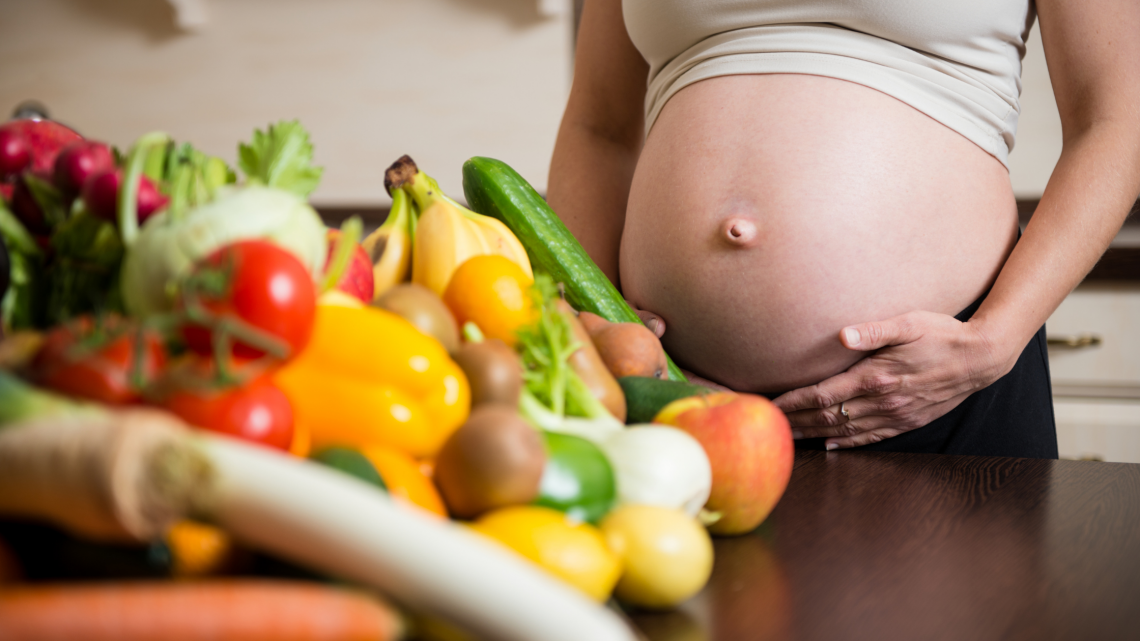
There’s a whole world of delicious options that give you and your baby everything you’ll need. Keep your healthcare team informed of your eating choices and let them guide you on a plan with any necessary supplements.
This list should be a good start towards a healthy, well-nourished pregnancy.
Quick tips for foods to eat when pregnant
- Dairy products, especially yogurt, are a great choice. They help you meet increased protein and calcium needs.
- Legumes are super sources of folate, fiber, and many other nutrients. Folate is a very important nutrient during pregnancy.
- Sweet potatoes are an excellent source of beta carotene, which your body transforms into vitamin A. Vitamin A is important for the growth and differentiation of cells in your growing baby.
- Salmon contains the essential omega-3 fatty acids EPA and DHA, which are important for brain and eye development in your growing baby. It’s also a natural source of vitamin D.
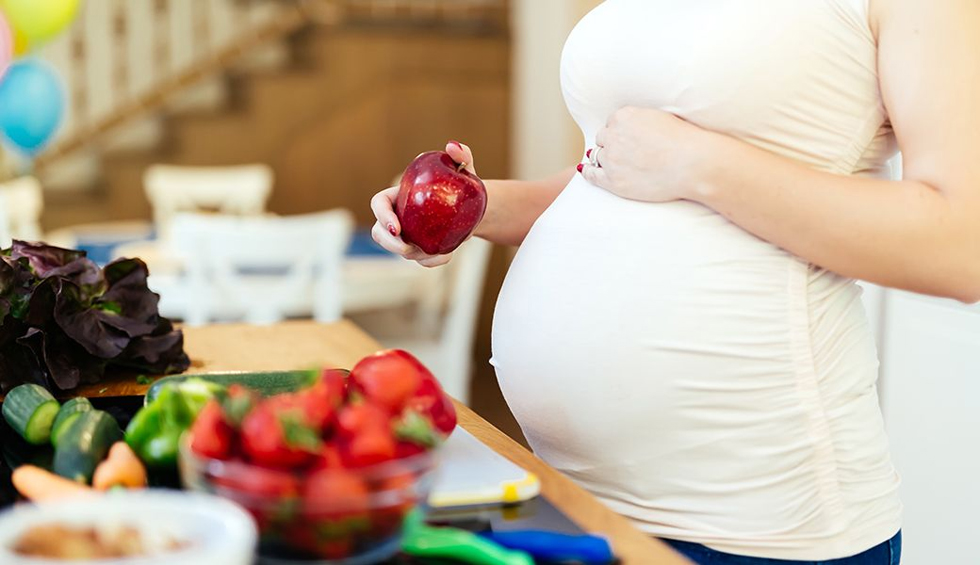
- Whole eggs are incredibly nutritious and a great way to increase your overall nutrient intake. They also contain choline, an essential nutrient for brain health and development.
- Broccoli and leafy greens contain most of the nutrients that you’ll need. They’re also rich in fiber, which may help prevent or treat constipation.
- Lean meat is a good source of high-quality protein. Beef and pork are also rich in iron, choline, and B vitamins, all of which are important nutrients during pregnancy.
- Berries contain water, carbs, vitamin C, fiber, vitamins, antioxidants, and plant compounds. They may help you increase your nutrient and water intake.
- Whole grains are packed with fiber, vitamins, and plant compounds. They’re also rich in B vitamins, fiber, and magnesium.
- Avocados contain high amounts of monounsaturated fatty acids, fiber, folate, and potassium. They may help relieve leg cramps, too.
- Dried fruit may be highly beneficial for pregnant women since they’re small and nutrient-dense.
Just make sure to limit your portions and avoid candied varieties, to prevent excess sugar intake.
- Drinking water is important as your blood volume increases during pregnancy. Adequate hydration may also help prevent constipation and urinary tract infections.
Nutrition during pregnancy | Family Medical Center
Top 10 Foods to Eat During Pregnancy
Expectant mothers have to constantly think about what they eat, whether it is good for their baby. This situation is exhausting, especially given the mass of conflicting information floating around. Is fish healthy, or is there too much mercury in it? Do you need meat as a source of protein or is it too fatty? Can I eat eggs, or do they have too much cholesterol?
No wonder if all this thinking makes you feel down and you want to eat a chocolate bar to cheer you up. But don't do it! Or at least read our article first. There are many ways to make sure you and your baby are getting the nutrients you both need.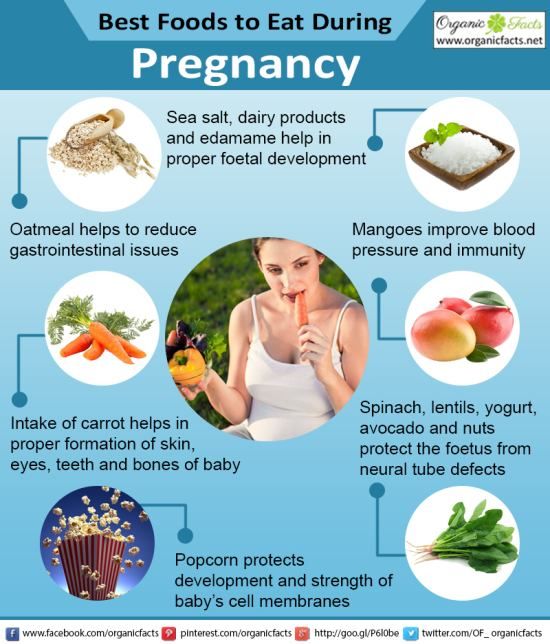 In this article, pregnancy nutrition experts talk about the foods they think are the best. You don't have to love and eat all of these foods, just choose what you like.
In this article, pregnancy nutrition experts talk about the foods they think are the best. You don't have to love and eat all of these foods, just choose what you like.
Eggs during pregnancy
It's amazing how many nutrients are contained in one egg. And that's only 90 calories!
In addition to 12 vitamins and minerals, eggs contain a large amount of high-quality protein needed by pregnant women. Your baby's cells grow exponentially, and each one is made of protein. Plus, you, as a pregnant woman, also need protein.
Eggs are also rich in choline, which ensures the full physical and mental development of your child, as it helps prevent neural tube defects. Some eggs contain omega-3 fatty acids, which are important for brain and vision development (often, factories producing eggs with omega-3 fatty acids will indicate this on the packaging).
But what about bad cholesterol found in eggs? Eating saturated fats has been shown to raise cholesterol levels in the body much more than foods containing natural cholesterol.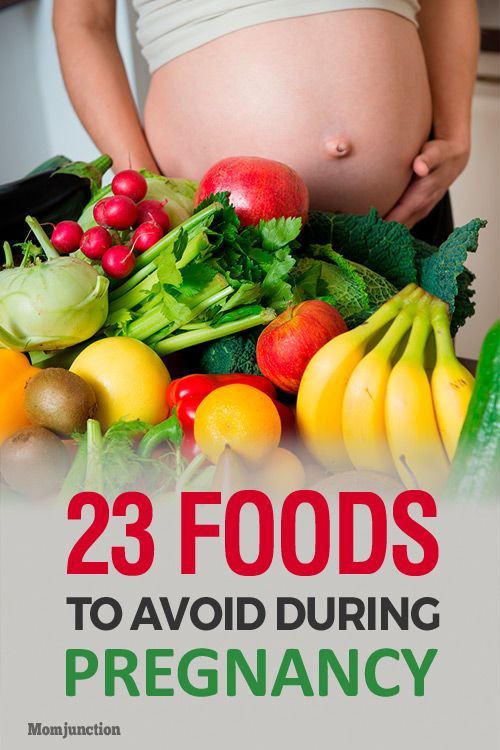 And although eggs are high in cholesterol, they contain a small amount of saturated fat (only 1.5 grams per egg).
And although eggs are high in cholesterol, they contain a small amount of saturated fat (only 1.5 grams per egg).
Nutritionists believe that a woman who has no health problems and normal blood cholesterol levels, eating a balanced diet low in saturated fat, can eat 1-2 eggs per day.
Eggs have other advantages - they are cheap, you can quickly and easily cook different dishes from them. When you're too tired to cook a full meal, you can just hard-boil a couple of eggs or make an omelet.
Salmon during pregnancy
Salmon is not only rich in high quality protein, this fish is also an excellent source of omega-3 fatty acids. Also, unlike swordfish, king mackerel, tilefish, and shark, salmon contains only trace amounts of methylmercury, a compound that can harm your baby's nervous system development. To avoid oversaturation of the body with mercury, experts recommend eating no more than 340 grams of salmon or other types of fish with a low content of mercury, such as light tuna and pollock, during the week.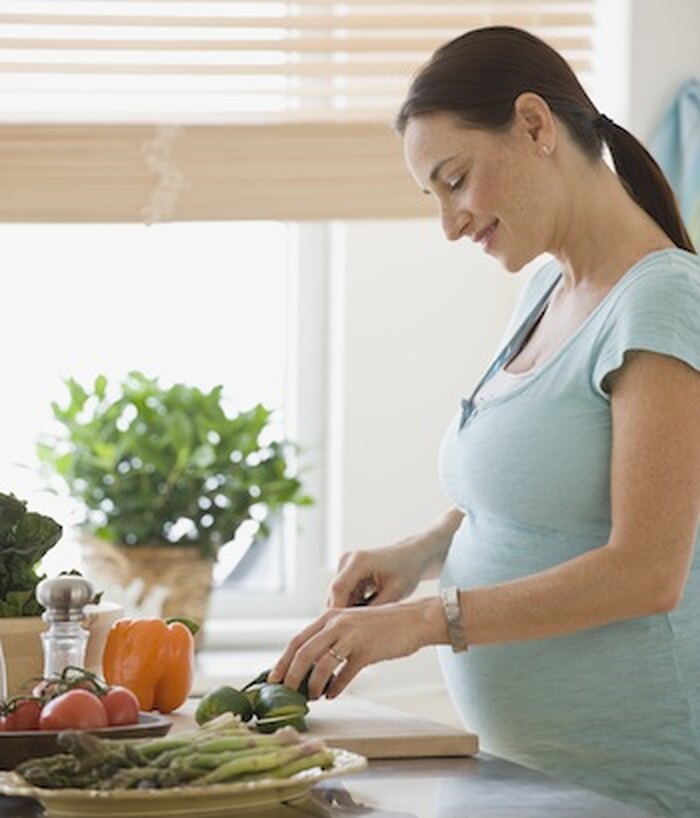
Legumes during pregnancy
Beans, lentils, black beans, spotted beans, chickpeas… The choice is huge! Of all vegetables, legumes contain the highest amount of dietary fiber and protein.
You already know how important protein is during pregnancy. But you may hear about dietary fiber for the first time, while this substance can become your best friend for all nine months of waiting for a baby. During pregnancy, the work of the gastrointestinal tract slows down, which can lead to constipation and hemorrhoids. Dietary fiber will help prevent or solve these problems.
In addition, foods containing dietary fiber are very nutritious. This includes beans, which are an excellent source of iron, folate, calcium, and zinc.
Sweet potatoes and other orange vegetables during pregnancy
Sweet potatoes get their orange color from carotenoids, plant pigments that our body converts to vitamin A. liver, milk, eggs) can be dangerous, this does not apply to carotenoids. Our body converts exactly as many of these substances into vitamin A as it needs. Therefore, there is no need to limit the amount of fruits and vegetables rich in vitamin A in your diet.
Our body converts exactly as many of these substances into vitamin A as it needs. Therefore, there is no need to limit the amount of fruits and vegetables rich in vitamin A in your diet.
Sweet potatoes are also a source of vitamin C, folate and dietary fiber. You can cook many different dishes from it.
Carotene (vitamin A) is also found in carrots, pumpkins, tomatoes, rose hips and some orange fruits.
Popcorn and other whole grains during pregnancy
Yes, you read that right: popcorn. It also applies to whole grains. Whole grains are beneficial during pregnancy, as they are rich in dietary fiber and nutrients, including vitamin E, selenium and phytonutrients - plant-based nutrients that can protect our cells from harmful effects.
But don't limit yourself to popcorn and forget about other whole grains: oatmeal, whole grain bread, buckwheat, pearl barley.
Walnuts during pregnancy
You don't like fish and eggs, but still want your baby to get omega-3 acids, which are so important for brain development? Nutritionists advise trying walnuts.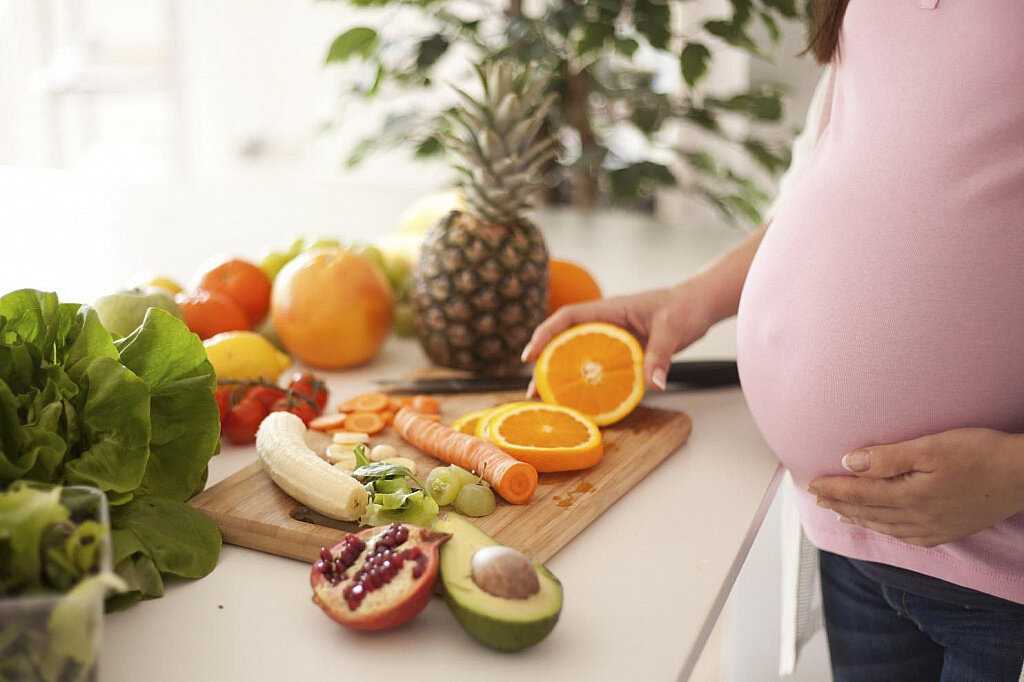 It is one of the richest plant sources of omega-3 acids. A handful of walnuts makes a great snack or addition to a salad.
It is one of the richest plant sources of omega-3 acids. A handful of walnuts makes a great snack or addition to a salad.
Yoghurt, fermented baked milk, kefir during pregnancy
Dairy products are a source of calcium, which is vital for expectant mothers. If you don't get enough calcium in your diet, it will still be supplied to your baby from your body's internal stores, depleting your bones and teeth.
Nutritionists believe that the main task of expectant mothers is to provide the baby with all the necessary nutrients without sacrificing their health. Calcium will help you keep your own bones strong while your baby's bones are being formed.
Dark greens and leafy vegetables during pregnancy
Spinach, kale, lettuce (chard, iceberg, etc.) - Green leafy vegetables are packed with nutrients and vitamins, including vitamins A, C, and K, as well as the all-important folates. In addition, it has been proven that they have a beneficial effect on vision.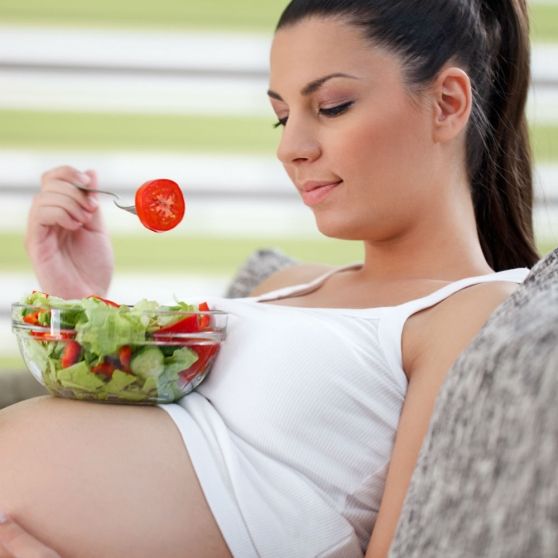
Lean meat during pregnancy
According to nutritionists, meat is an excellent source of high quality protein. Choose lean meat, no fat. Among all types of meat, nutritionists distinguish beef and pork, since in addition to protein, they contain choline.
Do not eat store-bought meats or hot dogs. Although they have been cooked, there is still a small risk that your child may be exposed to bacteria or parasites such as Listeria, Toxoplasma, or Salmonella through these foods.
Multi-colored fruits and vegetables during pregnancy
Eating green, red, orange, yellow, purple and white vegetables and fruits ensures that you and your baby get a variety of nutrients. Vegetables and fruits of each color provide the body with different vitamins, minerals and antioxidants.
There is another advantage of eating a variety of vegetables and fruits - in late pregnancy, the baby can already taste the taste of food by swallowing amniotic fluid.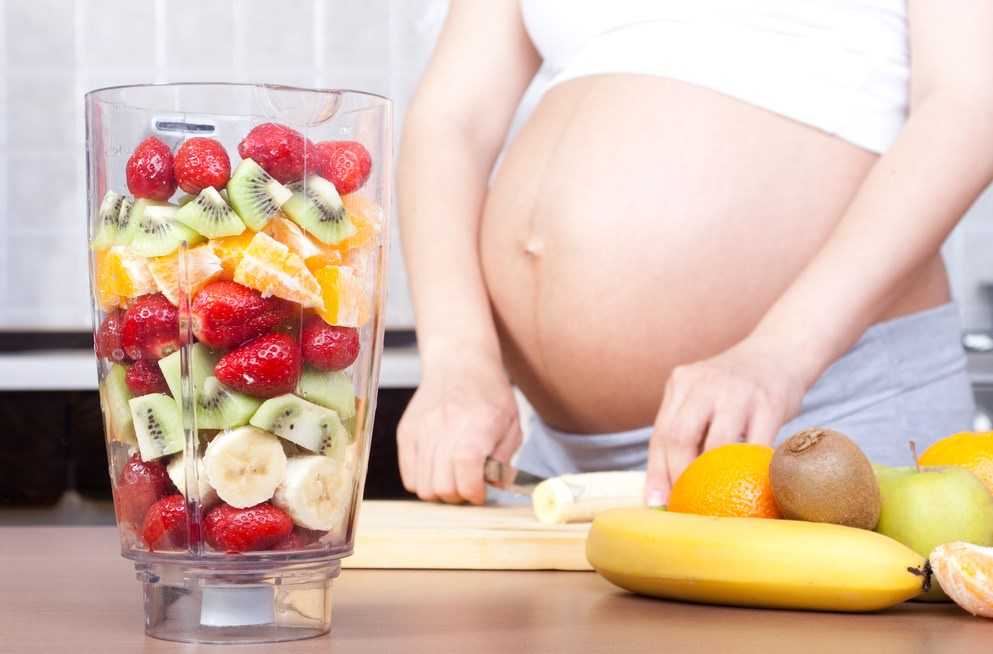 So if you introduce your child to the taste of healthy vegetables and fruits already in the womb, there is a great chance that in the future he will recognize them and will eat them with pleasure.
So if you introduce your child to the taste of healthy vegetables and fruits already in the womb, there is a great chance that in the future he will recognize them and will eat them with pleasure.
Based on materials from http://www.babycenter.ru
What you can and cannot eat during pregnancy - tips on proper nutrition
Contents:
- Nutrition in the first trimester
- Second trimester diet
- Diet in the third trimester
- Is it possible to prevent allergies in a child
- Foods not to eat during pregnancy
During pregnancy, it is very important to eat right: a balanced diet of the expectant mother is one of the sources of the necessary components for the proper development of the baby.
For a pregnant woman, "eating for two" should not mean "eating twice as much", but "eating twice as good". Proper nutrition during pregnancy is important not only in terms of the health of the unborn child. This will help you feel better, be less tired, prevent you from gaining extra pounds, and help you quickly get in shape after giving birth. Here are some helpful tips 1 :
Here are some helpful tips 1 :
- Eat small, frequent meals.
- Drink plenty of fluids.
- Eat a varied diet, eat meat, fish, poultry, eggs, dairy products, cereals, soups, fruits, vegetables, grains.
- If you are experiencing nausea, you can try to satisfy your hunger with dry salted crackers and biscuits.
- Avoid fatty foods, fried, spicy, smoked and sweet.
It is also important to know that changes occur in the body of a pregnant woman in each trimester, so the diet at different times will be different. What foods do you and your baby need?
Nutrition in the first trimester
Generally, there is little to no weight gain during the first and second months of pregnancy, while one to two kilograms are added in the third month. During this period, you need to eat nutritious foods, and the more varied your diet, the better. First of all, these are vegetables rich in folic acid: broccoli, Brussels sprouts, spinach, asparagus, avocados, lentils, red beans.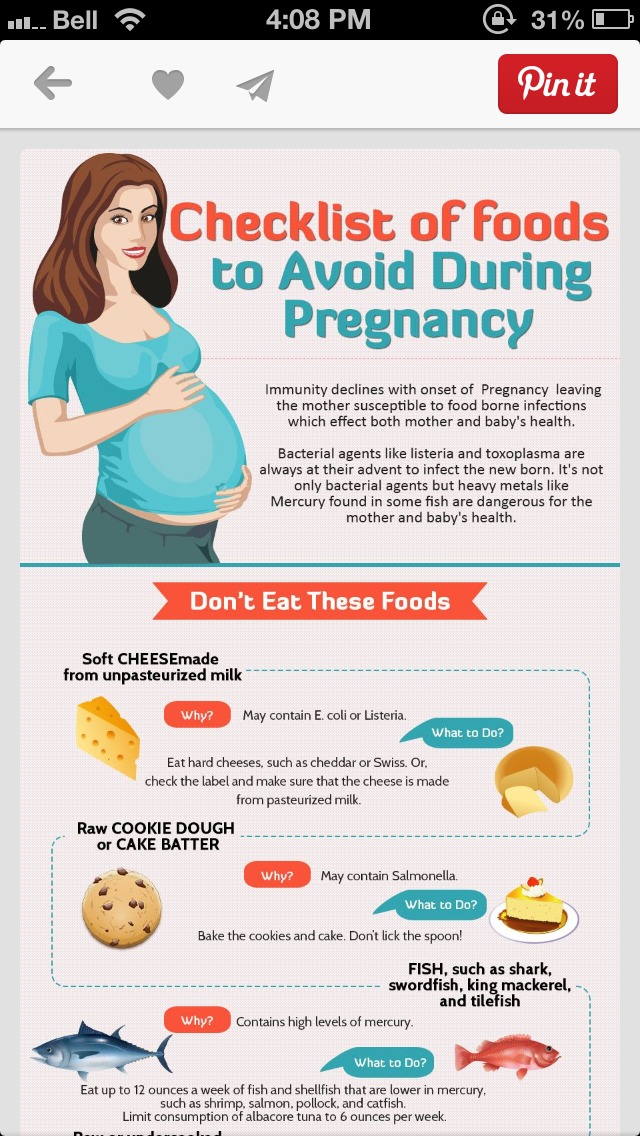 There is a lot of it in flax and sunflower seeds and nuts: almonds, peanuts, hazelnuts. Folic acid is especially important in early pregnancy as it helps build the baby's major organs such as the heart and brain 2 .
There is a lot of it in flax and sunflower seeds and nuts: almonds, peanuts, hazelnuts. Folic acid is especially important in early pregnancy as it helps build the baby's major organs such as the heart and brain 2 .
At this stage, it is important to eat fish and meat - sources of iron, which support the formation of the brain and contribute to the development of intelligence. It is important to remember that these products must necessarily undergo heat treatment: eating them raw can lead to toxoplasmosis, helminthiasis 3 .
Many women in the first trimester of pregnancy suffer from nausea. One way to alleviate the situation is to eat little and often throughout the day, avoiding large meals.
Reduce your intake of saturated fats such as butter and cream as early as the first trimester to avoid gaining extra pounds.
Try to replace sweets with fruits. They contain vitamins and minerals that both you and your baby need. And they are rich in fiber, which helps the normal functioning of the intestines.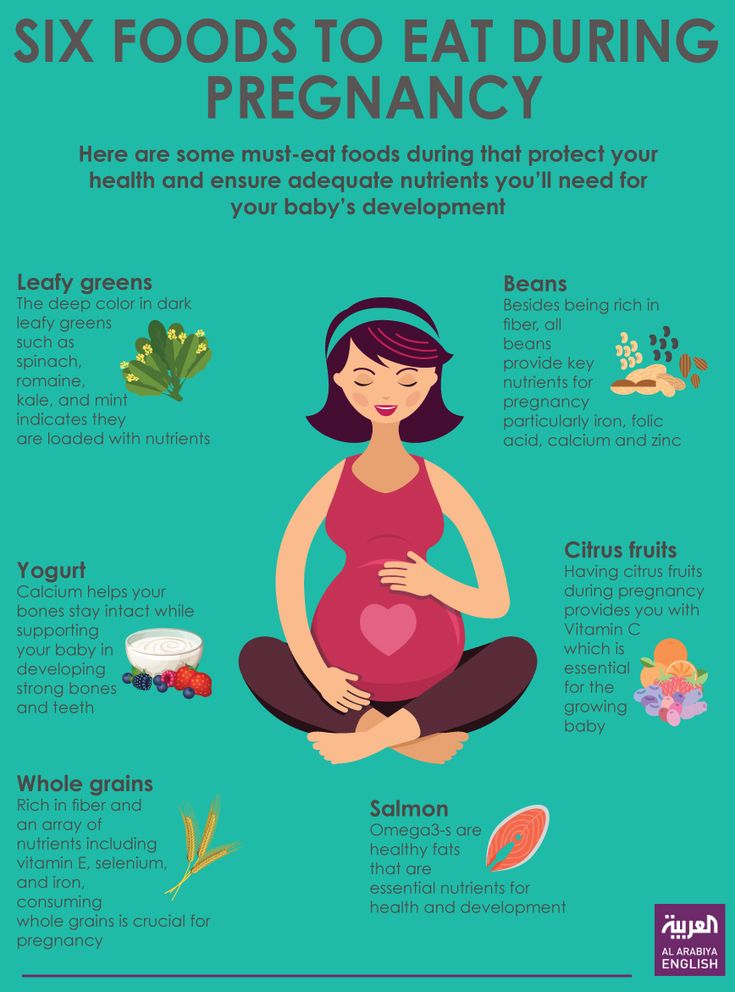
Diet in the second trimester
In the second trimester, a woman begins to gain weight, on average adding about five kilograms in three months. During this period, the bones of the unborn baby begin to form. That is why it is so important to eat foods rich in calcium. First of all, it is dairy - yogurts, cheeses, cottage cheese, kefir and so on. When choosing yogurt, give preference to natural ones - they do not contain dyes and sugar. Vitamin D is needed to absorb calcium better, so try to get out in the sun more often 4 .
The need for folic acid is still high in the second trimester. So stick with the green vegetables and other foods on your first trimester list.
The baby gets bigger and presses on the intestines of the expectant mother - this is how constipation occurs. Therefore, doctors advise drinking plenty of non-carbonated water and eating more fiber, which improves digestion. In particular, oatmeal or wheat bran will help with constipation.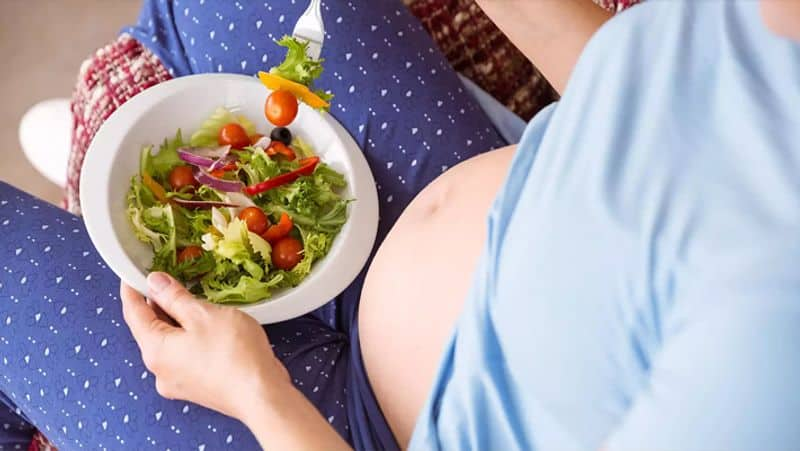
Another common problem in pregnant women is heartburn. Avoid fatty and spicy foods (this also applies to pregnant women who do not suffer from heartburn), eat often, but little by little, chew thoroughly and do not go to bed immediately after eating.
Iodine ensures the functioning of the thyroid gland and the normal development of the baby's brain 5 . The easiest source is iodized salt. In addition, a lot of iodine is found in seafood.
Diet in the third trimester
During the third trimester, a pregnant woman gains about six kilograms, so by the end of pregnancy, the weight increases by an average of 12 kg.
Compared to the previous trimester, the diet should not change dramatically, but an additional 200 kcal per day should be added to the previous diet.
As the child grows and develops, the body needs more vitamin C and even more fibre.
Vitamin C helps the body absorb iron from foods. The main source of vitamin C is fruits. An orange or half a grapefruit for breakfast, a couple of kiwis for an afternoon snack, apples, pears, grapes, watermelon - and you have received a daily dose of 6 .
An orange or half a grapefruit for breakfast, a couple of kiwis for an afternoon snack, apples, pears, grapes, watermelon - and you have received a daily dose of 6 .
With the approach of childbirth, it is worth increasing the intake of iron, vitamins and antioxidants in the body, which will help you get in shape after the birth of your baby.
Mom's power during the adoption of an important factor. However, in Russia, 70-80% of women suffer from a lack of vitamins, regardless of the season of the year 7 . Vitamin-mineral complexes will help to fill the lack of vitamins and minerals in the mother's diet.
Is it possible to prevent allergies in a child
So far, scientists have not figured out how to prevent food allergies in a child during pregnancy. Just because you don't eat peanuts during your entire pregnancy, for example, doesn't mean your baby won't develop a peanut allergy later on.